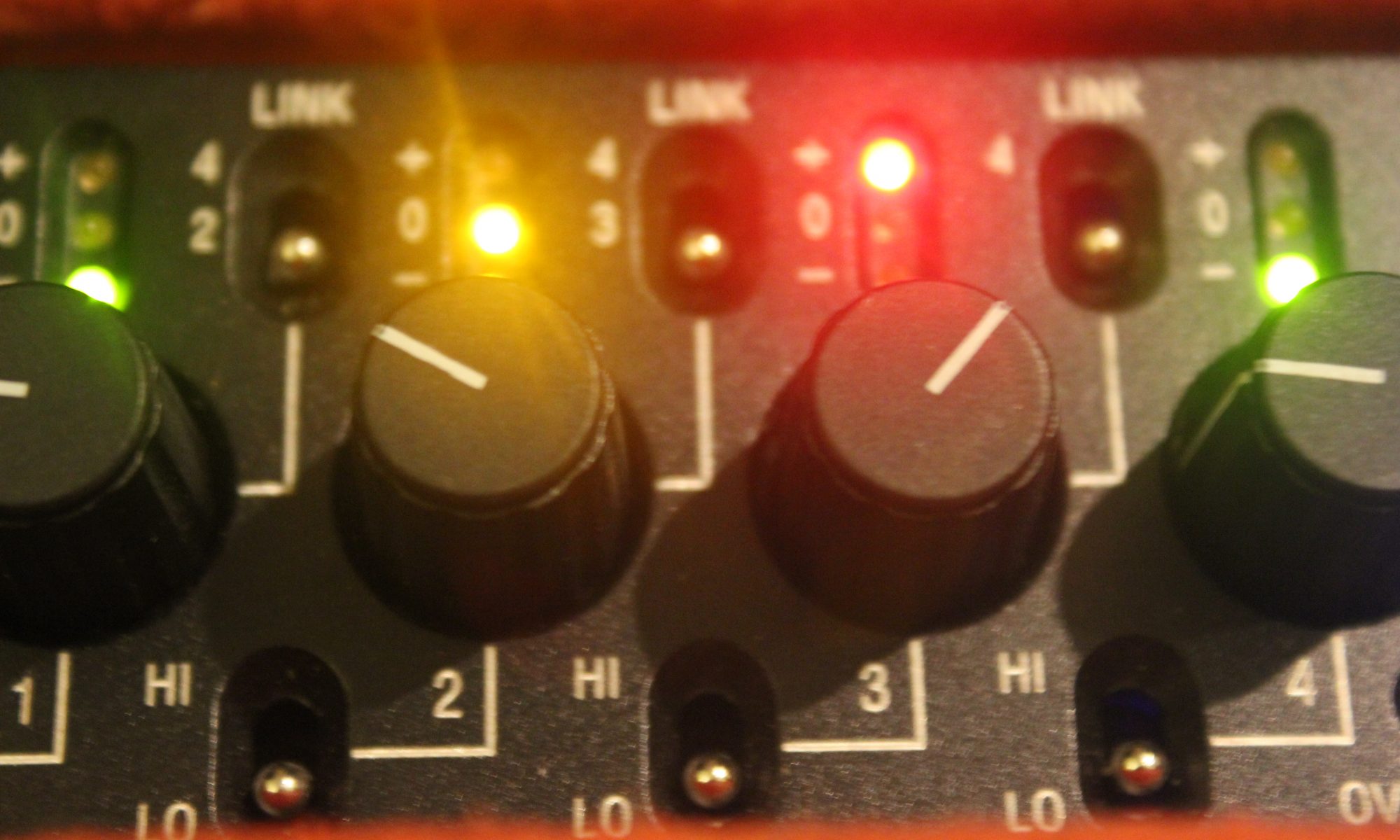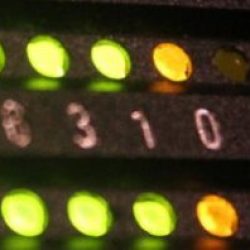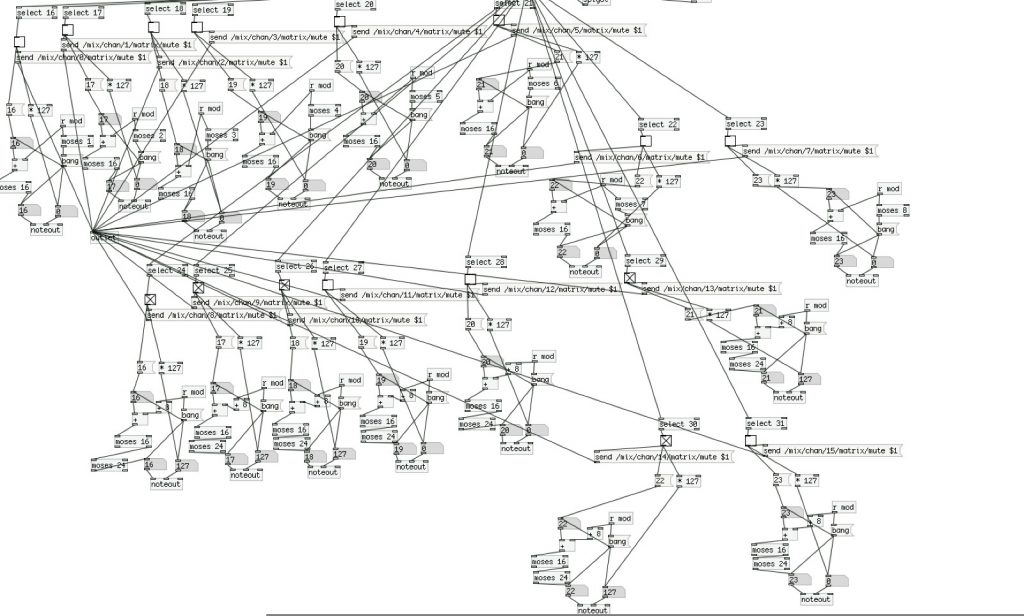Earlier this year I made a post about the theoretical use of audio interfaces as digital mixers. Since then I’ve got some toys and the experiments have begun:
Pure Data patch converting Mackie MCU to @motutech AVB OSC pic.twitter.com/HBzaK2EzpB
— Richard Thomas (@richtsound) October 28, 2017
Motu 8D
I ended up getting a good deal on 2 of these interfaces. They each have 8 channels of AES3 audio in and out with sample rate conversion, although some of the connections are 75ohm RCA for consumer SP/DIF. They are also happy with a variable voltage range and are happy with reversed polarity on the DC input (even though the plug says 15V centre positive). The AVB connection allows them to link together and address multiple channels from one interface, essentially making a modular interface with all sorts of connections. Together they have 16 inputs and outputs.
Control Surface
I started off here running a Keith McMillen K-Mix, however it just runs standard midi control change and note outputs. These are easy to deal with and re-route, however I came across some issues with resolution which were solved by using a control surface that runs the Mackie Control Universal protocol (MCU). The cheapest one I could find was an iCon Platform M.
Lost in Translation
The problem with the MOTU interfaces in this instance was that they used a nice control protocol for computers to talk to each other, but not control surface hardware- they’re designed the interface with the view that it’s used on an ipad or similar. They use Open Sound Control to communicate (documentation here), so there needs to be a way of converting midi commands to this. It’s also one way- the interface doesn’t send any data back. So, I needed a way of translating midi commands to OSC.
Pure Data
After looking at a few solutions, and realising I can’t program properly- it dawned on me that I could use Pure Data. It’s an open source graphical programming language (similar to the proprietary Max/MSP) and I’d used it before on various music performance projects. It would also run on a raspberry pi– so could have a low power dedicated computer to do the translation work. I found it was actually pretty straightforward to get the midi in and the OSC out, however came across a few snags…
Linear faders
This is one of those terms where everything gets confusing. Yes, linear faders can mean they’re in a straight line- rather than rotary faders, which you turn. The potentiometers, however need to be logarithmic- every 3dB of attenuation is a halving of voltage. In most midi applications this would normally be done at the software end, but here it’s just a number being fed in. In order to do this a bit of mathematical transformation of the data was required and the higher resolution of the faders really helped in MCU (they’re used as pitch bend controls on each channel).
Mechanisation
In order to run 16 channels from an 8 channel controller I decided (possibly foolishly) to create a second layer on the PD patch and send back data to the control surface. It works, however the mute and solo buttons unexpectedly turned out to be a headache!
Wot, no Dante?
I had a look and I couldn’t find and DC powered interfaces with a Dante connection and a mix engine. Best option I can think of is to use a MADI interface (such as a MOTU M64 or RME Madiface Pro) and a Directout Exbox.md or Ferrofish Verto series converter
Talkback
I haven’t put a dedicated talkback control in yet, but should be a case of pressing a button to open a fader. There is a dedicated talkback button on the newer Motu 828es, however- although it only has mains power
I Want This
If you want to have a go with it, please feel free to get in touch. I can’t offer any kind of warranty or technical support at the moment- it’s just a thing I made. It should hopefully work with any of the Motu AVB interfaces and midi controllers with MCU emulation. It requires pd-extended 0.43-4 to run



DC Powered AD/DA converter with Preamps, Madi, Midi, Dante, SPDIF, Wordclock, Analog, etc…
Ferrofish A32Dante.
It does all you want and more —- I’ve been using one on my mix cart for 6 months with zero issues.
Hi Aaron,
The ferrofish unit looks like a really useful converter and could work with this system, however it doesn’t have a DSP mix engine in. I’m looking at using this as a lighter, battery powered alternative to something like an 01V96.
So, you could go: Ferrofish A32 -> MADI Interface with mix engine (eg MOTU M64 or RME Madiface pro) -> SD 970 or similar
Or, if using a recorder with Dante: A32 -> MADI interface-> A32 -> Dante recorder.
Another really useful looking DC powered digital converter is the Appsys MVR-64 http://appsys.ch/en/products/digital-format-converters/multiverter-mvr-64
Hi Richard! I am super grateful that you took the time to work on this project because it is quite exactly the missing link I was looking for in a new system I am looking to design. I am actually looking to use the Icon QCon Pro X or XS with a MOTU 828es as the core of a system for a community radio station in Chicago (que4.org). I want to use AVB over CueMix products because I want to be able to route audio from other parts of our community center and broadcast things happening on different stages via the radio room. Talk Back and potentially other custom mappings may be needed, and while I am a pretty savvy tech, I am definitely not a programmer or software engineer… So I might need your help figuring out some details. For starters, how can I get the PureData project you created for OSC translation? Thank you!
Hi there ! I would be really interested in trying your patch out and maybe (if you’re ok) work on it. Would you care to share it ? Thank you very much
Hello, I’m interested in trying this out ,any chance to get it from you?
Dex
Yes, sure – pop me an email on rt@rtsound.net